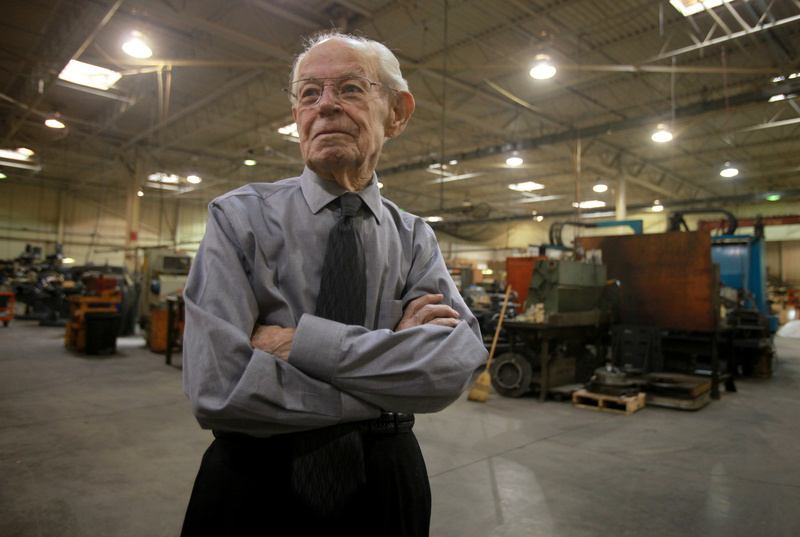DETROIT — Al Churchill’s first car was a Model T.
These days, he’s driven to work in a 2012 Lincoln Navigator.
Work?
The 97-year-old Royal Oak, Mich., resident goes to his office every day, and has no plans to stop. Churchill owns Troy, Mich.-based Magnetool, a company he founded 60 years ago using training he got at the long-shuttered Henry Ford Trade School.
“It’s more fun to work,” he said. “Do I have a hobby? Yes, magnets.”
Churchill is one of a handful of nonagenarians still earning paychecks full time. The number of older Americans who choose to work later and later in life is growing. According to the U.S. Bureau of Labor Statistics, 1.2 million Americans age 75 or older were working last year, up from 787,000 in 2001.
“Some of these young people, kids, have a lot more vitality. They can work longer hours than I can, but … all I can do is bring my own experience,” said Robert Halperin, 90, a loan officer at John Adams Mortgage in Southfield, Mich. “It’s important for people to realize they can keep productive for a long time. They don’t have to sit on the stoop and rock.”
Numerous studies have shown that staying on the job later in life has numerous advantages, such as decreased dementia, longer lifespan and greater happiness, said Cathy Lysack, deputy director of Wayne State University’s Institute of Gerontology, whose almost-80-year-old father is a full-time surgeon.
“There’s a small portion of older adults who are amazingly great at what they do. They have the abilities to perform at a very high level in late life, and it’s meaningful for them to work. They’re still rewarded,” she said.
Dick McNeilly, who has worked in the membership office of the Better Business Bureau in Southfield for 35 years, agreed.
Working “takes all my time. I don’t want to have to sit around and watch TV,” the 92-year-old Detroiter said. “I plan to work as long as I can. … The work we do is very important to the community.”
For the senior-senior set, having a sense of purpose, staying busy and keeping cognitive skills sharp is worth it.
“I have no real outside hobbies that would challenge me and keep my gray matter from disintegrating too quickly, because it does go downhill after a certain age,” Halperin said. “People I know who retired (with) no real interests, they died earlier. This is a stimulant for me.”
That’s why at 87, he decided to take the loan officer licensing exam.
“It’s a sense of accomplishment. They don’t want to be a burden on society, so they work,” the former home-builder said. “People at these ages, 75 and above, are younger than they used to be.”
Employers see the benefits, too.
“He brings a ton of experience. He’s still very productive, and he brings a lot of joy to people here. People love speaking to him. He’s got a ton of stories,” said Larry Bsharah, president of John Adams Mortgage.
Another example of that kind of added value? Leo Keeps, who, after he sold his hotel-restaurant food business 33 years ago, went to work in sales for Detroit’s Wolverine Packing, one of his former suppliers.
“I’m working with 17 other young salesmen, and I stay in the loop,” said the 92-year-old Southfield resident. “What keeps me going is getting up every morning and knowing there’s a place to go, a place I enjoy and the challenge of the sales every day is one I’ve enjoyed every day all my life. Why quit?”
Churchill sure won’t anytime soon.
“I feel sorry for them, because it’s necessary for people to have something important to do or something they think is important to do,” he said about his fellow “oldest old” Americans who gave up commuting decades ago. “If I didn’t work? There’s no such thing. … Work is important, because without work, you’re nothing.”
Send questions/comments to the editors.



Comments are no longer available on this story